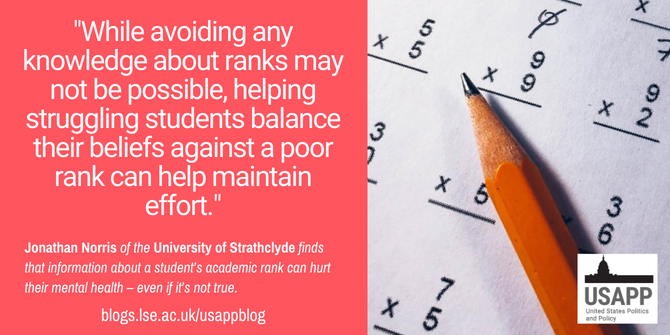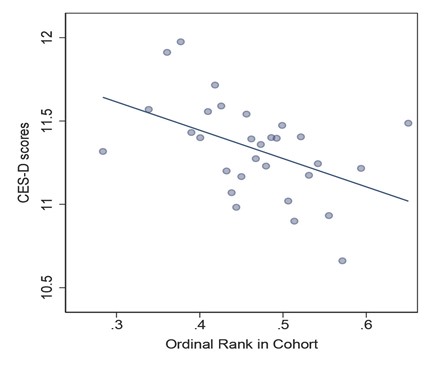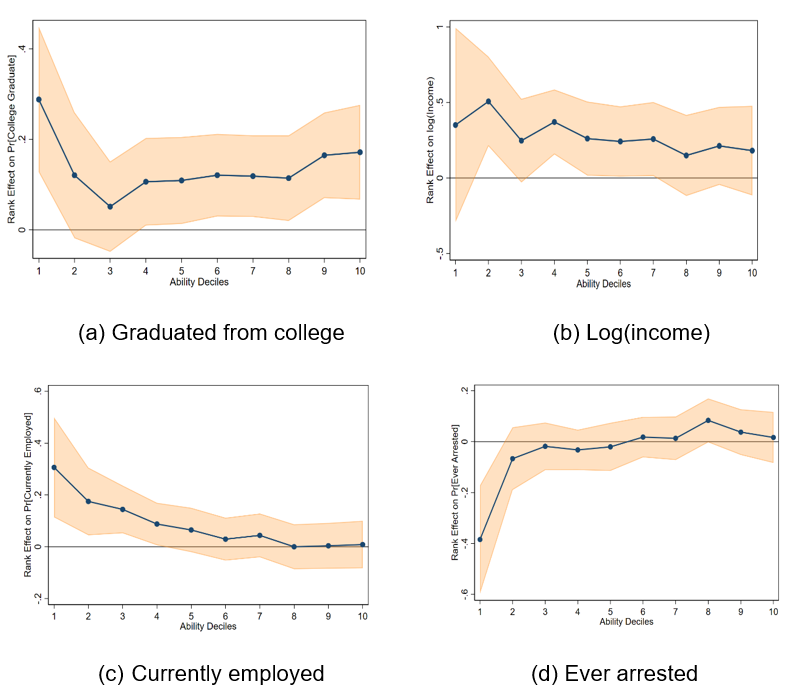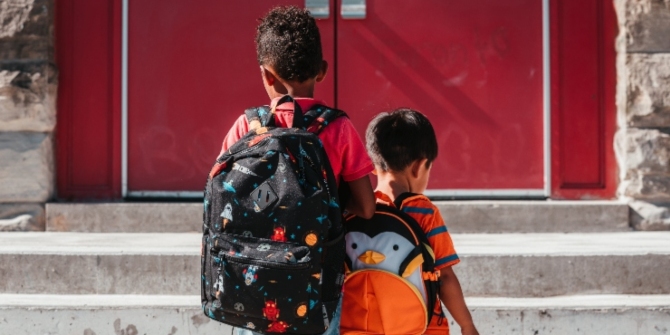The long-term consequences of students’ poor mental health and its effects on their academic performance can be profound. Jonathan Norris explores how knowledge of a student’s academic ranking within their cohort can affect their mental health. He argues that while a student’s academic rank is an inaccurate predictor of their potential and actual ability, negative information about their rank can have a huge impact on their perceived future outcomes.
There are many reasons to be concerned about the mental health of young people. As much as half of mental ill-health begins by age 14 and those who experience episodes of poor mental health during adolescence are at greater risk for repeat episodes later in life. Beyond the human cost there is also an economic cost with poor mental health linked to higher healthcare costs and a loss of productivity. To effectively intervene, it is important to understand the mechanisms that make mental distress during school-age more or less likely.
In new research, Lukas Kiessling and I analyse a specific feature of school environments and assess how students’ knowledge of the rank of their academic ability compared to their peers affects adolescents’ depressive symptoms. To do this we developed a framework – based on leading cognitive and attributional theories which emphasise how incorrect beliefs serve as a source of depression – which describes how random information can demotivate students leading to depression.
How information and beliefs relate to mental health
Our framework is simple. In it, students are unsure about their true level of ability but attempt to learn about it and then update their beliefs. These beliefs are then sensitive to both accurate and inaccurate information sources. Accurate sources can be students’ actual performances on class tests or feedback from teachers. Inaccurate sources could vary across environments, but one example is a student’s academic rank among their peers in school. We think of this rank as a potentially inaccurate source of information about a student’s true potential, as the same student could have a very different rank among a cohort of peers with different abilities than their current group of peers.
In our theory, students downgrade their beliefs about their abilities when they receive signals about their potential that serves as negative information. When beliefs fall too low, they withdraw their effort consistent with depressive symptoms such as a loss of motivation. In turn, this loss of effort over time can cascade into long-term consequences for education, economic success, and mental health.
Testing the relationship between students’ ability rank and their mental health
To test the predictions from this framework, we use quasi-random variation in the ability ranks of students across school-cohorts. Our data is from Add Health, a nationally representative longitudinal study in the US that uniquely allows us to observe students with their schoolmates in schools across the country and then follow a group of these students into adulthood. Based on this we begin by testing the relationship between ability rank and mental health.

Photo by Chris Liverani on Unsplash
Figure 1 shows that on average students who have a better ability rank among their peers experience few depressive symptoms during adolescence. This is consistent with our learning model where students look for information to use in updating their beliefs. In this case, a better rank serves as a positive source. We then find that a better rank does improve students’ own beliefs about their academic futures.
Figure 1 – Relationship between depressive symptoms (CES-D) and rank among peers

Negative vs. positive shocks about academic ability rankings
The theory suggests additional nuance. Students who receive negative information will experience stronger effects than those who receive positive information. Why? Negative information places students at greater risk of their beliefs falling too low leading to a state of withdrawn effort. We can determine that this is the case by comparing students who receive a worse rank than expected against those who receive a better rank. The negative shock hurts mental health and the rank effect on mental health among this group is enhanced (i.e., the lower one’s rank when the shock is negative the worse their mental health).
This asymmetry result has important implications. Beyond simply academic ranks, it implies that when students receive negative shocks to their beliefs about their potential, they can be at risk of more depressive symptoms and more likely to withdraw their effort. Ranks may only be one such potential source that highlights how this mechanism can work. To further illustrate the point, in extended results we find that the most negatively affected students are those who both live in poverty and receive a worse than expected rank. The suggestion here is that when students already face multiple adverse events small sources of information about their potential can have outsized effects.
The effects differ across the ability distribution
We also find that low ability students experience stronger rank effects on their mental health during adolescence, and they drive the long-run effects for mental health measured when respondents were 26-32 years old. These students may represent another group where conditions have already hindered their beliefs. Small sources of information, such as from their rank among peers, may then be enough to keep their beliefs up or to curtail their beliefs to the point of giving up effort.
We further find – as Figure 2 shows – that this long-run pattern where ranks are most important for low-ability students is replicated on educational and economic outcomes. These results are consistent with our theory where increases in rank would help these students, who may have already lower beliefs, to keep their beliefs and effort up. Sustained effort then can translate into better long run outcomes.
Figure 2 – Long-run rank effect education and economic outcomes

Why we need to be careful with information about academic rankings
There are several insights here for policy and more broadly for stakeholders endeavouring to improve mental health among students. One, is the specific point that we need to be aware and careful with how information about rankings is passed to students. While avoiding any knowledge about ranks may not be possible, helping struggling students balance their beliefs against a poor rank can help maintain effort.
Indeed, rank shocks need not be destiny. We also find that students who are more conscientious are less affected by a worse than expected rank. Recognizing the potential consequences of rankings and supporting student resiliency could then buffer their choices about where to focus their efforts against negative information shocks.
Second, our theory also has broader lessons. It suggests that any source of information students may use to update their beliefs about their potential can have consequences, particularly when these come from negative signals. This provides an organising framework to think about how a new program or intervention may affect students differentially depending on whether it will likely generate positive or negative signals and to target the students who may be the most sensitive to “shocks” such as those already facing multiple life stressors.
- This article is based on the paper, ‘The Long-Run Effects of Peers on Mental Health’ in the Economic Journal.
- Please read our comments policy before commenting.
- Note: This article gives the views of the author, and not the position of USAPP – American Politics and Policy, nor the London School of Economics.
- Shortened URL for this post: https://bit.ly/3CVAiGP






